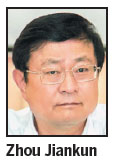
Health of the environment must be considered when making decisions about economic growth
Anshun, a city in Southwest China's Guizhou province, is known for its Huangguoshu Waterfall, the largest of its kind in Asia, whose majesty and power can be viewed from all angles, even from inside.
The city of about 3 million people, some 30 hours by train from Beijing, is arguably an ideal place to observe from all angles how the central authorities' pro-growth measures have flowed outward, empowering far-flung regions.
"We have maintained steady growth, promoted reforms through innovation, optimized the economic structure and ultimately brought tangible benefits to the people," Zhou Jiankun, an NPC deputy from Anshun, said at a news conference.
The conference was organized on Tuesday in Beijing to offer the media a glimpse of how Anshun has translated into action the central government's five new development concepts - innovation, coordination, green development, opening-up and sharing.
Zhou, who also serves as top leader of Anshun, said the city has sought to strike a balance between economic growth and environmental protection, considering the mountainous region's fragile ecology.
The fossil-fuel-rich city has weaned itself from its former dependence on coal and switched to emerging industries such as big data, medical health and new building materials by taking advantage of its preferential investment policies, pristine air and abundant stone resources used in construction and masonry, according to Zhou.
The coal-powered electrical industry accounted for 36.4 percent of all industry in Anshun in 2014. The ratio dropped below 30 percent last year.
As the Guizhou Aviation Industry Group, a subsidiary of the mammoth Aviation Industry Corp of China, is based in Anshun, the city is keen to develop civilian drones, which have promising market prospects, he said.
"Anshun's economy grew by 13.6 percent last year," Zhou said. "The city grew the fastest among its peers in Guizhou without making a dent in ecology."
In 2015, the city sank 130 billion yuan ($19.9 billion) into infrastructure and industrial projects, laying a solid foundation for growth in the years to come, according to Zhou.

And he said Anshun had spared no effort to lift its rural poor out of dire straits. The country's poverty line is 2,300 yuan ($350) in annual income, measured in 2010 value.
The city government dispatched 1,007 cadres to help ramp up poverty reduction in all its 1,007 villages last year, Zhou said.
"Entrepreneurs have also lent a hand," he said.
For example, Wang Wei, chairman of the Xingwei Group in Anshun, pooled more than 300 million yuan to improve infrastructure for Xiushui village in the city's Puding county early last year. As a result, the village of 3,512 residents raked in 1.2 million yuan in tourism revenue during the weeklong Spring Festival holiday, he said.
At least 105,300 people said goodbye to poverty last year, Zhou said.
To help the remaining 340,400 poor lead a better life, the city will encourage farmers to form rural cooperatives and develop modern agriculture techniques suitable for mountainous regions, according to Zhou.
Contact the writers at [email protected]
(China Daily 03/11/2016 page5)